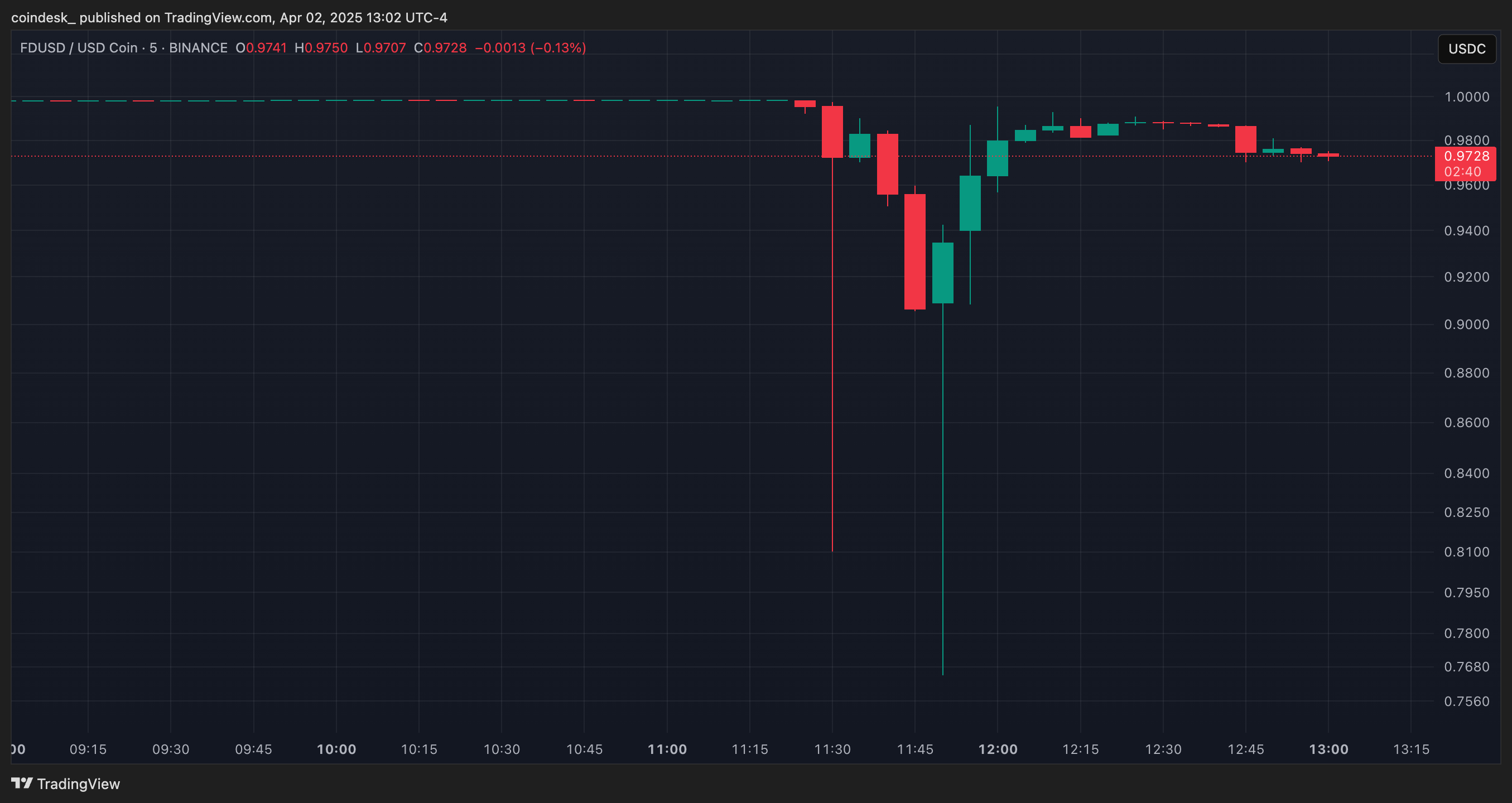Uncategorized
First Digital to ‘Pursue Legal Action’ Over Justin Sun Allegations as FDUSD Drops

FDUSD, the stablecoin issued by Hong Kong-based First Digital, has wobbled from its $1 price peg as investor concerns mounted over its reserves, though the company said Wednesday that it was «completely solvent.»
FDUSD has dropped to 0.87 against Tether’s USDT stablecoin and 0.76 against Circle’s USDC on Binance, the main exchange where FDUSD is listed. Notably, bitcoin (BTC) also nearly hit 100,000 against FDUSD. The token has stabilized around $0.98-$0.96 later, still trading below its supposed price anchor.

The sudden price action happened as CoinDesk earlier Wednesday reported that some of the TrueUSD stablecoin’s reserve assets were stuck in illiquid investments, according to filings. Tron founder Justin Sun bailed out the issuer company. First Digital Trust, a trust company affiliated to First Digital, was appointed to manage TUSD reserves.
«First Digital Trust (FDT) is effectively insolvent and unable to fulfill client fund redemptions. I strongly recommend that users take immediate action to secure their assets,» Tron founder Justin Sun claimed in a Wednesday X post.
First Digital refuted the allegations in an X post, saying that «First Digital is completely solvent» and «every dollar backing FDUSD is completely, secure, safe and accounted for with US backed T-Bills.»
«This is a typical Justin Sun smear campaign to try to attack a competitor to his business. As we told the reporter at CoinDesk, we have not yet had the opportunity to defend ourselves and instead of letting the TUSD matter be dealt with in court, Justin has instead resorted to a coordinated social media effort to try to damage FDUSD as a business competitor,» the company said. «FDT will pursue legal action to protect its rights and reputation.»
FDUSD’s latest monthly reserve report showed that the $2 billion of reserve assets were held mostly in U.S. Treasury bills and a lesser part in repo facilities and fixed deposits.
UPDATE (Apr. 2, 17:15): Updated FDUSD price action.
Uncategorized
Elon Musk vs. the regulators
Welcome back to TechCrunch Mobility, your hub for all things “future of transportation.”
Uncategorized
Nvidia’s AI empire: A look at its top startup investments
Over the last two years, Nvidia has used its ballooning fortunes to invest in over 100 AI startups. Here are the giant semiconductor’s largest investments.
Uncategorized
Dating app Cerca will show how Gen Z really dates at TechCrunch Disrupt 2025
Cerca is a dating app that sets users up with mutual friends.
-

 Business12 месяцев ago
Business12 месяцев ago3 Ways to make your business presentation more relatable
-

 Fashion12 месяцев ago
Fashion12 месяцев agoAccording to Dior Couture, this taboo fashion accessory is back
-

 Entertainment12 месяцев ago
Entertainment12 месяцев ago10 Artists who retired from music and made a comeback
-

 Entertainment12 месяцев ago
Entertainment12 месяцев ago\’Better Call Saul\’ has been renewed for a fourth season
-

 Entertainment12 месяцев ago
Entertainment12 месяцев agoNew Season 8 Walking Dead trailer flashes forward in time
-

 Business12 месяцев ago
Business12 месяцев ago15 Habits that could be hurting your business relationships
-

 Entertainment12 месяцев ago
Entertainment12 месяцев agoMeet Superman\’s grandfather in new trailer for Krypton
-

 Entertainment12 месяцев ago
Entertainment12 месяцев agoDisney\’s live-action Aladdin finally finds its stars


